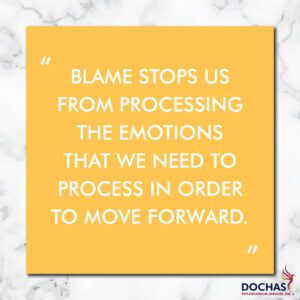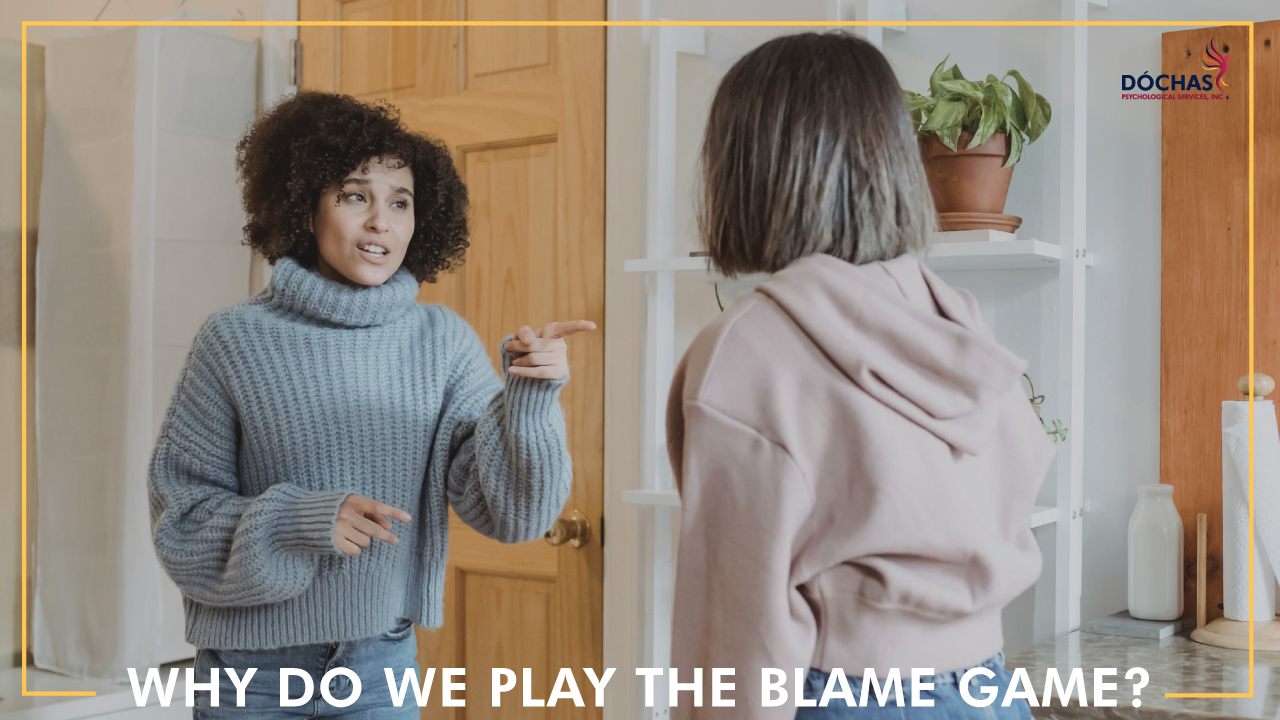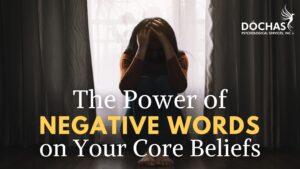Have you ever noticed how crappy it feels to be blamed for something that you didn’t do? Or, have you ever been in a situation where you desperately want someone to take responsibility for their part in what’s happening? Both of these situations involve blame! It’s Kim here, and today we are talking about the “blame game.”
You can watch my video about the blame game, or read on!
Blame is really interesting because to me it represents two kinds of things. First, blame is about trying to get somebody to accept responsibility. Second, blame itself is a really icky feeling, because it can trigger feelings of guilt and shame in whoever is being blamed, whether it’s yourself or somebody else.
The best way to think about blame is a kind of continuum. On the one end, we have people who blame themselves for absolutely everything, and then on the other end, we have people who will take no responsibility whatsoever for anything that they ever do. I invite you to consider where you are on that continuum, because either one can really affect your relationships.

There are some great articles about the continuum and our desire to blame, but today I want to talk about two points that I’ve noticed when it comes to blame:
Blame as a Way to Shift Guilt
Nobody likes to feel guilt and shame, and blame can feel like a really great way to shift those emotions outward. If a situation happens and someone’s blaming us for something, we automatically want to do a tit-for-tat and blame them for something else. Sometimes we blame them for things that have nothing to do with the situation that we’re talking about—it’s a you stung me so I’m going to sting you back reaction.
This can quickly turn into a conflictual situation that doesn’t need to happen. We don’t want to own our own stuff—it makes us feel bad—but when we do own our own stuff we can take steps to mend the relationship and make things a little bit healthier.
But sometimes it’s hard to pause when someone’s blaming us, or when we have a desire to blame somebody else. It’s hard to pause and say, what is this actually about for me? Am I trying to not take responsibility for myself? Or did that person actually hurt me in ways that I need to acknowledge? Try to take this time to ask yourself these questions!
Rather than talking about “the stuff” it’s helpful to talk about “the underneath.” Taking the time to work through how you feel can help you get to a place where you can do that.
Blame as a Way To Control The Uncontrollable
Another way blame is used is in an attempt to understand something so we can have control over it. For example, when my mom was diagnosed with cancer I had this desire to figure out how it happened, because if I could blame that one thing, then maybe it could be changed.
When we do this, we can pretend that we have some semblance of control. And sometimes. yeah, the thing that we’re blaming did actually cause the event, but it doesn’t change the fact that the event happened or that we feel awful about it. It’s just a way of delaying our grief.
It’s a way of saying, if I can just find the solution then I can change it, or I can prevent it, or I could protect myself, or protect others. It comes from a place of fear, and goes into that emotional place.
In both of these situations, blame stops us from processing the emotions that we need to process in order to move forward. Blame helps us move around it but it doesn’t get rid of the overall ick, the lingering. I call them fish hooks that keep us back in that situation, that then create a trigger later on. So the blame game might provide relief and some reprieve from the ick for a moment, but it doesn’t actually help us long term.

So I invite you to think about something that you’ve been blaming others for or that you’ve been blaming yourself for and ask yourself what is this really about. What hurt am I holding on to and how is blame helping me to hold on to it? What am I trying to serve here? See if you can figure out a different way to provide yourself with some relief! And in the meantime, we’re here for you—you can contact us by email at info@dochaspsychologicalservices.com or by phone at 780 446 0300. Just know that we see you, and we know this kind of thing is hard, and we’re here to help you through it. So until next time, you just take care of yourself and stop blaming yourself for stuff. Be gentle with yourself!
Resources: 5 Reasons We Play the Blame Game
About Dóchas Psychological
Dóchas Psychological Services is a well-established and trusted therapy clinic located in Spruce Grove, Alberta. At Dóchas we value the idea that everyone deserves a safe space. Through connection and education, our team works hard to build a trustworthy relationship with each of our clients. It is our goal to create a community for our clients to feel like they belong.
Disclaimer
Information provided through Dóchas Psychological Services blogs or vlogs is meant for educational purposes only. They are NOT medical or mental health advice. You can read more about our disclaimer here.









